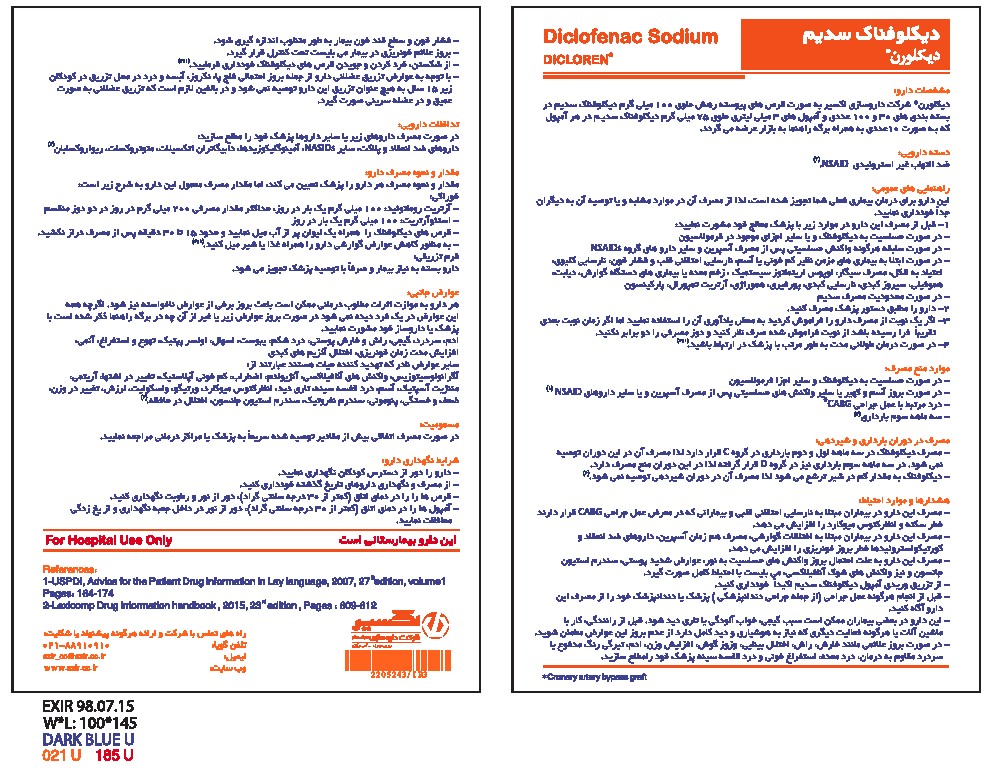DICLOREN
ampoule Diclofenac Sodium 25mg/ml ( 3ml )

| Generic Name of Product | Brand Name | Dosage Form | Strength | Pharmacologic Group | Therapeutic Group | Unit Per Pack |
| Diclofenac | Dicloren® | Ampoule | 75 mg/3ml | NSAIDs | Analgesics | 10 |
Indications And Usage | Dicloren is provided as a solution for injection, containing 75 mg Dicloren in 3 ml, to be given by intramuscularly (into a muscle) or intravenously (into a vein) as an infusion. Dicloren is indicated for the treatment of painful conditions, such as kidney stone pain, osteoarthritis (degeneration of joints) and rheumatoid arthritis (inflammation of joints), back pain, gout (formation of crystals in joints), injuries and fractures in children aged over 12 years, adults and older patients. |
Administration | Dicloren can be given by deep injection into the large muscle of the buttock. The usual dose is one ampoule once daily. One ampoule twice daily may be required in severe cases; the second dose being injected into the buttock muscle on the other side. The injection should not be given for more than 2 days. For colicky pain from the kidney area the dose is one ampoule injected into the buttock muscle and this dose may be repeated after 30 minutes if necessary. The total dose in one day should not exceed 150mg (two ampoules).Your doctor may decide on smaller doses if you are: an older person frail or you have a low body weight |
Contraindications | Allergic to of Dicloren or any of the other ingredients of Dicloren, A stomach (gastric) or duodenal (peptic) ulcer, or bleeding in the digestive tract, Allergic reaction to ibuprofen, aspirin, or other NSAIDs, asthma, Kidney or liver problems, Dehydrated or have recently lost a lot of blood, Have severe heart failure, Have a condition where you don’t stop bleeding normally, Had a stroke, Taking other NSADs, Taking anticoagulant drugs, More than 6 months pregnant, Taking medicines known as SSRIs used to treat depression, Have an intolerance to some sugars, Stomach or bowel problems after you have taken other NSAIDs, Heart disease and /or cerebrovascular disease, Heart attack, stroke, mini-stroke (TIA) or blockages to blood vessels to the heart or brain, Problems with your blood circulation, Breast-feeding. |
Precautions | Talk to your doctor, nurse or pharmacist before you are given Diclofenac Sodium:• If you smoke• If you have diabetes• If you have angina, blood clots, high blood pressure, raised cholesterol or raised triglycerides.• If you have heart problems, previous stroke or think that you might be at risk of these conditions (for example if you have high blood pressure, diabetes or high cholesterol or are a smoker) you should discuss your treatment with your doctor or pharmacist.• If you suffer from any of the following: blood abnormalities, bleeding conditions, Crohn’s disease, inflammation of the colon.• If you have a history of any of the following: stomach or bowel ulcers, vomiting of blood or black, tarry faeces and Gastro-intestinal ulcers• If you have a history of stomach problems when you are taking NSAIDs, particularly if you are elderly, you must tell your doctor straight away if you notice any unusual symptoms. Because it is an anti-inflammatory medicine, diclofenac may reduce the symptoms of infection, for example, headache and high temperature. If you feel unwell and need to see a doctor, remember to tell him or her that you aretaking diclofenac.• If you have heart, kidney or liver problems, or having medicines to increase urine volume such as diuretics, your doctor may monitor your kidney function.• If you have kidney, liver or heart problems.• If you are pregnant.• If you have a history of high blood pressure and/or heart failure.• If you suffer from or have previously suffered from asthma.• If you suffer from systemic lupus erythematous or mixed connective tissue disorders.• If you are an older patient.• If you have had or are about to have major surgery.• If you suffer from any blood or bleeding disorder.Dicloren is not recommended for use in children. |
Adverse Reactions |
• Frequent sore throats or infections |
Pregnancy and lactation | Pregnancy Dicloren should only be used during pregnancy when your doctor decides the benefits to you are greater than any possible risk to the unborn baby. Do not take Dicloren during the last 3 months of pregnancy as it may affect your baby’s circulation and kidneys. |
Renal and liver Impairment | Long-term administration of NSAIDs has resulted in renal papillary necrosis and other renal injury. Renal toxicity has also been seen in patients in whom renal prostaglandins have a compensatory role in the maintenance of renal perfusion. Patients at greatest risk of this reaction are those with impaired renal function, heart failure, liver dysfunction, those taking diuretics and ACE inhibitors, and the elderly. Discontinuation of NSAID therapy is usually followed by recovery to the pretreatment state. |
Laboratory Tests | Because serious GI tract ulcerations and bleeding can occur without warning symptoms, physicians should monitor for signs or symptoms of GI bleeding. In patients on long-term treatment with NSAIDs, including diclofenac, the CBC and a chemistry profile (including transaminase levels) should be checked periodically. If clinical signs and symptoms consistent with liver or renal disease develop, systemic manifestations occur (e.g., eosinophilia, rash, etc.) or if abnormal liver tests persist or worsen, diclofenac should be discontinued. |

